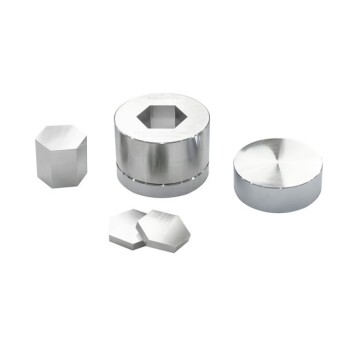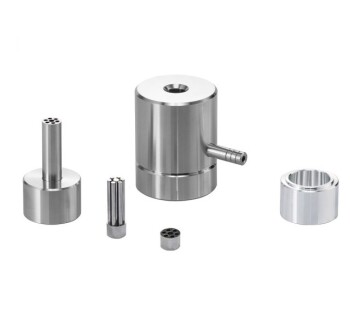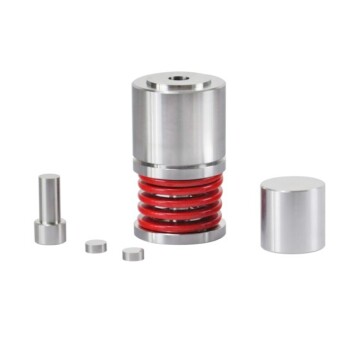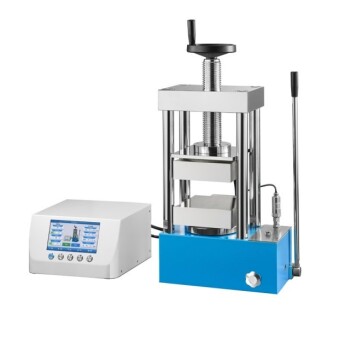At its core, a manufacturing press is a tool for applying immense, controlled force. This capability allows it to produce an exceptionally wide array of products, from simple test plaques and industrial seals to complex, high-performance aerospace components and printed circuit boards (PCBs). The process is defined by its high throughput and its ability to shape, compact, or form a diverse range of materials.
A product's suitability for press manufacturing is determined not by its industry, but by the required physical process. Presses excel at compacting, molding, or stamping materials like metals, plastics, ceramics, and composites into a final or near-final shape.
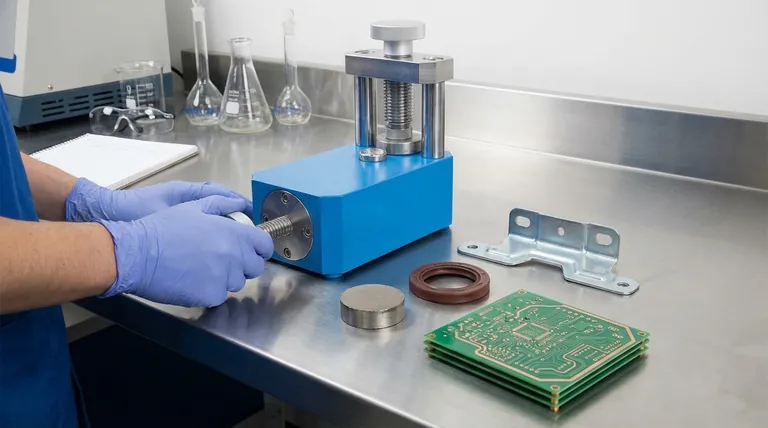
The Principle: How Force Creates Form
The fundamental function of any press is to apply pressure via a tool, die, or mold to a piece of raw material. This simple principle enables several distinct manufacturing processes, each suited to different materials and end products.
Compaction of Raw Materials
A primary use of presses is the compaction of powdered materials. This process involves using extreme pressure to densify powders into a solid form, often called a "green" part, before a final heating process like sintering.
This technique is critical for materials that are difficult to melt and cast. It is the standard method for producing parts from metals, ceramics, and certain composites.
Molding and Encapsulation
For polymers and composites, presses are used for various molding techniques. This involves placing a material (like a plastic resin or composite sheet) into a mold cavity and applying heat and pressure until it cures into the desired shape.
This method is used to create everything from molded cable ends to durable oil seals. It is also used for encapsulation, where a component like an electronic coil is encased in a protective polymer shell.
Stamping, Forming, and Coining
In metalworking, presses are synonymous with stamping. A sheet of metal is placed between a die and a punch, and the press action cuts, bends, or forms the metal into a specific shape.
This high-speed process is responsible for manufacturing an enormous volume of metal parts, from car body panels to the tiny metal contacts inside electronic devices.
Common Applications by Product Type
The versatility of press technology means its applications span nearly every industrial sector.
Electronics and PCBs
Presses are essential for manufacturing multi-layer printed circuit boards (PCBs). They apply precise heat and pressure to laminate layers of epoxy, woven glass, and copper foil into a single, durable board.
Aerospace and Defense
The aerospace industry relies on presses to form high-strength, lightweight components. This includes shaping composite panels for aircraft bodies and compacting specialty metal powders for engine parts that must withstand extreme conditions.
Industrial and Automotive Components
From engine gaskets and oil seals to suspension components and brackets, presses create durable, high-volume parts. The ability to mold rubber and stamp metal at high speed makes it a cornerstone of automotive supply chains.
Understanding the Trade-offs
While powerful, press manufacturing is not the right solution for every problem. Understanding its limitations is key to making an informed decision.
The Critical Role of Tooling
Every press-manufactured part requires a custom tool, die, or mold. These tools are often made from hardened steel and can be extremely expensive and time-consuming to produce.
This high upfront cost means press manufacturing is generally only economical for high-volume production runs where the cost of the tool can be amortized over many thousands or millions of parts.
High Throughput vs. Low Flexibility
Once a press is tooled up, it can produce parts at an incredible speed, which is why it is considered a high-throughput process.
However, this comes at the cost of flexibility. A change in the part's design requires a costly and time-consuming change to the tooling, unlike more agile processes like CNC machining or 3D printing.
Making the Right Choice for Your Product
To determine if a press is the appropriate technology, evaluate your project's core priorities.
- If your primary focus is mass production of a stable design: A press is likely the most cost-effective method for high volumes of plastic, metal, or composite parts.
- If your primary focus is creating dense, strong parts from powders: Compaction via a press is the industry-standard method for specific metals and ceramics.
- If your primary focus is prototyping or low-volume runs: The high tooling cost makes press manufacturing unsuitable; consider 3D printing or CNC machining instead.
- If your primary focus is extremely complex geometry: Parts with intricate internal channels or undercuts may be impossible to form with a traditional press and die system.
Ultimately, the decision to use a press hinges on balancing the need for speed and low per-piece cost against the initial investment in tooling.
Summary Table:
| Product Type | Materials Used | Common Applications |
|---|---|---|
| Electronics | Epoxy, copper foil | Printed circuit boards (PCBs) |
| Aerospace | Composites, metal powders | Aircraft panels, engine parts |
| Automotive | Metals, rubber | Gaskets, seals, brackets |
| Industrial | Plastics, ceramics | Cable ends, oil seals, coils |
Need a reliable press for your lab's high-volume production or material compaction? KINTEK specializes in lab press machines, including automatic, isostatic, and heated lab presses, designed to deliver precise force control for industries like electronics, aerospace, and automotive. Enhance your efficiency and product quality—contact us today to discuss your specific needs and discover how our solutions can benefit your projects!
Visual Guide
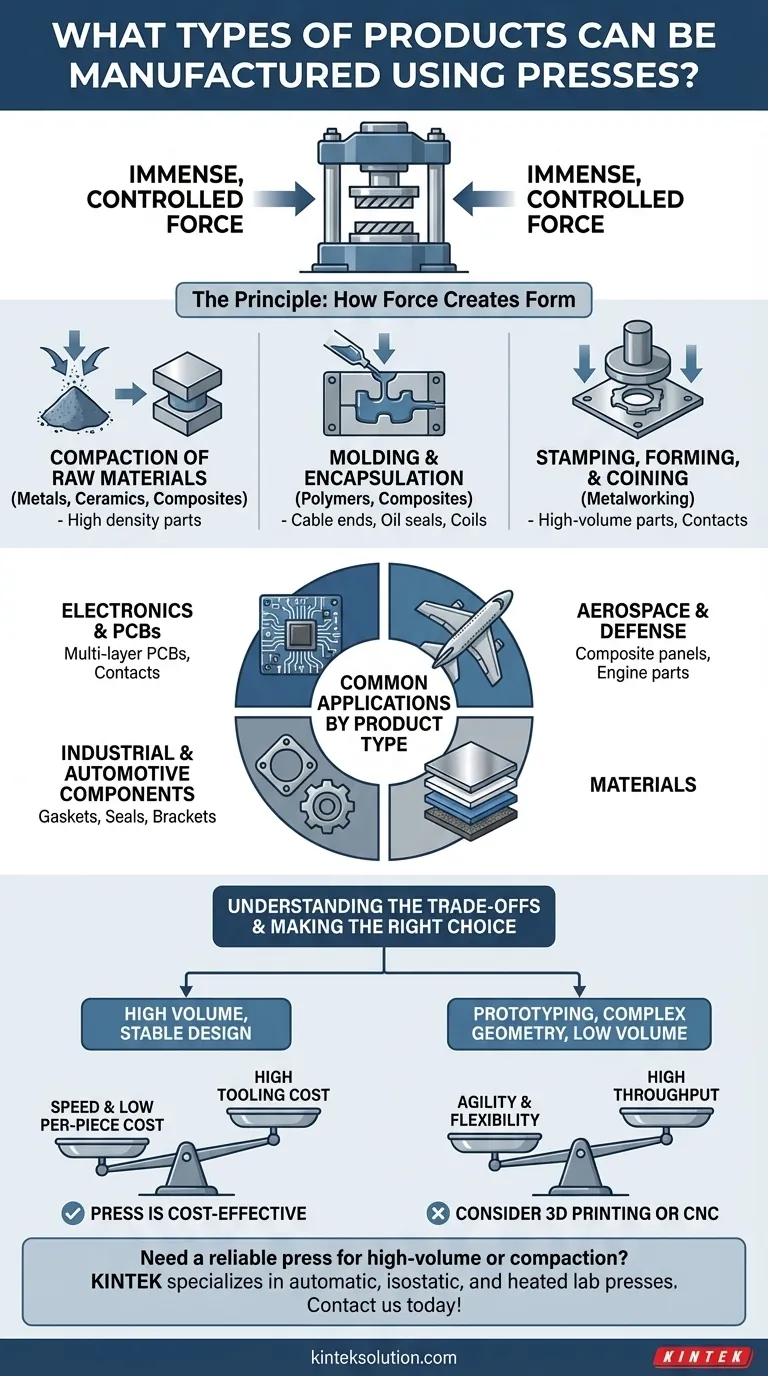
Related Products
- Laboratory Hydraulic Press 2T Lab Pellet Press for KBR FTIR
- Automatic Laboratory Hydraulic Press Lab Pellet Press Machine
- Manual Heated Hydraulic Lab Press with Integrated Hot Plates Hydraulic Press Machine
- Lab Polygon Press Mold
- Laboratory Hydraulic Press Lab Pellet Press Button Battery Press
People Also Ask
- How is a laboratory hydraulic press used for polymer melt crystallization? Achieve Flawless Sample Standardization
- What role does a high-pressure laboratory hydraulic press play in KBr pellet preparation? Optimize FTIR Accuracy
- What are some laboratory applications of hydraulic presses? Boost Precision in Sample Prep and Testing
- What role does a laboratory hydraulic press play in carbonate powder prep? Optimize Your Sample Analysis
- Why is sample uniformity critical when using a laboratory hydraulic press for humic acid KBr pellets? Achieve FTIR Accuracy



